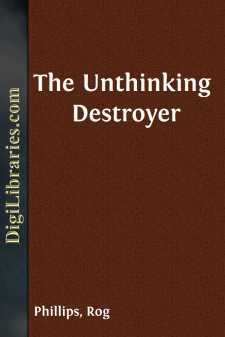Categories
- Antiques & Collectibles 13
- Architecture 36
- Art 48
- Bibles 22
- Biography & Autobiography 813
- Body, Mind & Spirit 142
- Business & Economics 28
- Children's Books 15
- Children's Fiction 12
- Computers 4
- Cooking 94
- Crafts & Hobbies 4
- Drama 346
- Education 46
- Family & Relationships 57
- Fiction 11828
- Games 19
- Gardening 17
- Health & Fitness 34
- History 1377
- House & Home 1
- Humor 147
- Juvenile Fiction 1873
- Juvenile Nonfiction 202
- Language Arts & Disciplines 88
- Law 16
- Literary Collections 686
- Literary Criticism 179
- Mathematics 13
- Medical 41
- Music 40
- Nature 179
- Non-Classifiable 1768
- Performing Arts 7
- Periodicals 1453
- Philosophy 64
- Photography 2
- Poetry 896
- Political Science 203
- Psychology 42
- Reference 154
- Religion 513
- Science 126
- Self-Help 84
- Social Science 81
- Sports & Recreation 34
- Study Aids 3
- Technology & Engineering 59
- Transportation 23
- Travel 463
- True Crime 29
The Unthinking Destroyer
by: Rog Phillips
Categories:
Description:
Excerpt
"Hey, Gordon!"
Gordon Marlow, Ph.D., straightened up and turned in the direction of the voice, the garden trowel dangling in his dirt-stained white canvas glove. His wide mouth broke into a smile that revealed even white teeth. It was Harold Harper, an undergraduate student, who had called.
"Hop over the fence and come in," Gordon invited.
He dropped the trowel and, taking off his work gloves, reached into his pocket and extracted an old pipe. He filled it, the welcoming smile remaining on his lips, while Harold Harper approached, stepping carefully between the rows of carrots, cabbages, and cauliflower.
Harold held a newspaper in his hand. When he reached Gordon Marlow he held it open and pointed to the headline. ROBOT ROCKET SHIP TO MARS.
Gordon took the paper and read the item, puffing slowly and contentedly on his old pipe. His eyes took on an interested look when he came to the reporter's speculations on the possibility of intelligent life on Mars.
Finally he handed the newspaper back to Harold.
"You know, Harold," he said, "I wonder if they would recognize intelligent life if they saw it on other planets."
"Of course they would," Harold replied. "Regardless of its form there would be artifacts that only intelligent life could create."
"Would there?" Gordon snorted. "I wonder."
He squatted down, picking up the trowel and lazily poking it into the rich soil at his feet.
"That's why I wonder," he continued. "We are so prone to set up tests on what intelligent life is that we are likely to miss it entirely if it doesn't conform exactly to our preconceived notions. We assume that if a being is intelligent it must get the urge to build artifacts of some kind—pots and vases, houses, idols, machinery, metal objects. But MUST it? In order to do so it must have hands and perhaps legs. Suppose it doesn't have such things? Suppose that no matter how intelligent it might be, it could not do those things!"
"Then it wouldn't be intelligent, would it?" Harold asked, puzzled.
"We are assuming it is," Gordon said patiently. "There are other outlets for intelligence than making clay pots. As a last resort for an intelligent being there is always—thinking."
He chuckled at his joke.
"I've often wondered what it would be like to be a thinking, reasoning being with no powers of movement whatsoever. With bodily energy provided automatically by environment, say, and all the days of life with nothing to do but think. What a chance for a philosopher! What depths of thought he might explore. What heights of intellectual perception he might attain. And if there were some means of contact with others of his kind, so that all could pool their thoughts and guide the younger generation, what progress such a race might make!"
"And so we see," Ont telepathed, "that there must be a Whole of which each of us is a part only. The old process which says 'I think, therefore I am,' has its fallacy in the statement, 'I think.' It assumes that that assertion is axiomatic and basic, when in reality it is the conclusion derived from a long process of mental introspection....


